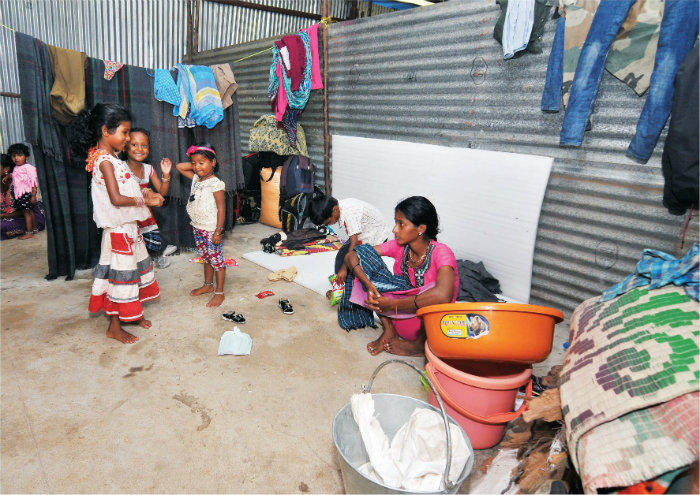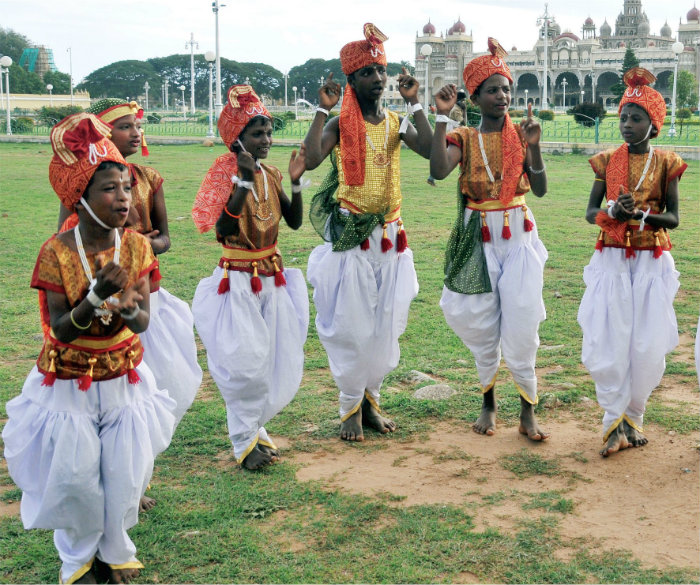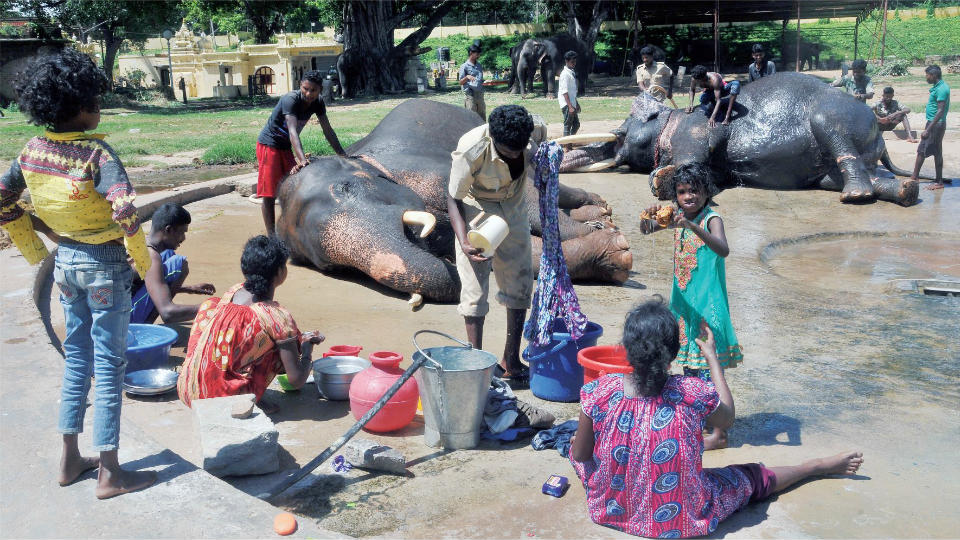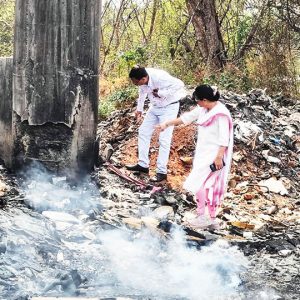By S. Pushpavathi
Elephants are astonishingly specific about their needs. To understand them one needs to think like the mahouts who themselves think like an elephant. A mahout’s life revolves around his elephant as he eats, sleeps and wakes up with it and even plans his day according to the elephant’s need.
A couple of mahout families have come to Mysuru as part of Dasara-2017 slated to begin from Sept. 21. Elephants are the major attraction of Dasara Jumboo Savari. And the unsung heroes behind the show are the mahouts. This year, 15 elephants are participating in Dasara and accordingly, 15 mahouts and 15 kavadis and their families are camping on the Mysore Palace campus.
While the mahouts and kavadis are busy taking care of the elephants and their needs 24×7, their wives and other members of family do the silent work cooking for their husbands and taking care of their children. They try to make the stay of the family in Mysuru — away from the forests — comfortable.

One of the Dasara jumbos being fed a trunk full of water…
If the daily routine of mahouts and kavadis starts at around 5 am as they go to their elephants to attend the cleaning and feeding duties, their wives wake up as early as 4 am to prepare breakfast for their husbands. The daily routine of mahouts and kavadis involve feeding the elephant, cleaning nails and feet, giving a bath and a scrub with copra and coconut shells.
The job of their wives is to ensure that their husbands are not hungry while performing their duties. The breakfast they cook is typically rice gruel (they use unpolished boiled rice as it is considered healthy than the polished rice) along with papad and spicy chutney made out of leaves, roasted chilli and tomatoes.
BORING CITY LIFE
Try to speak to them, they are reluctant to narrate their livelihood and their routine in Mysuru. A little prodding and they are ready to speak. And their first complaint: “City life is boring and we are raring to go back to the forests.” “Though the buildings are impressive, it is not as good as the lush green surroundings of the forests,” they add.
The women in the family get some time for themselves after their husbands go to attend the elephants and after their children leave for the ‘Tent School’ set up by the district administration. This time is spent in chatting with other women and taking care of little children who do not go to Tent School. They speak Jenukuruba language and their Kannada is hotchpotch with a heavy accent. It is a mixture of Jenukuruba-Kannada accompanied by occasional shy grin.

Special mahout Pasha dining with his family.
The glitter and glamour of city life does not enthuse these women. Their only connection with the city is through the vegetables grown here and supplied by the Forest Department. Occasionally they get fish and meat that they buy out of the money they get from the Department. “The sound of vehicles and their shrill horns are deafening and there is nothing to beat the wild sounds of the jungle and the musical chirping of birds. Sometimes it is very difficult to catch a wink in city even during night due to the sound,” they say.
FOREST LIFE AND ROUTINE
Arriving almost a month-and-a-half before Dasara to facilitate rehearsals, these families of elephant caretakers are supplied with enough rations, groceries, vegetables and meat by the Forest Department. “In the forests too, it is the same routine as elephants have to be taken care of. After breakfast and our children leave to school, we enter the forests to fetch firewood, edible leaves, mushrooms, tubers and nutritious roots. Our requirement is small and we do not over-exploit forests. It is like our mother,” says Shobha, wife of Mahout Satish from Mathigodu Elephant Camp. Apart from fetching forest produce, the women have the responsibility of washing clothes — layers of forest mud are usually deposited on them — filling water for drinking and washing purposes and cooking.

Kids of mahouts and kavadis at one of their sheds.
TOUGH TO HANDLE GAS STOVES
When asked about life on Palace campus, she says that they have been given gas stoves to cook. “We are used to cook in firewood and earthen pots. Cooking in metal vessels is no fun and it is not tasty. In forests, we are constantly busy while we idle around here as all the work gets over after the children leave for Tent School. We don’t venture out of the Palace compound as we are scared to cross roads and moreover we will get lost inside the city,” she says. Elephants are fond of fresh succulent grass. It is in the forests that they make a selection from the buffet of types of grass. The mahouts know what pleases the elephants and accordingly they direct their wives to cut particular variety of grass, tree barks and leaves.

A girl with motherly care trying to pick lice even as other tiny-tots wait for their turn!
EXTRA INCOME AT HOME
Manjula, wife of Dhobi, elephant Kaveri’s mahout, has a different take. “In the forests, whenever time permits and during seasons, we pick coffee cherries in the estates. This gives us extra income to support our family. We find it very difficult to spend time here and we have also brought some of our relatives here for our company. But still it is difficult to kill time and we prefer forests. We are waiting for the festival to get over and go back to our hearths,” she says with a wry smile.

Tribal boys enjoying some recreation time.
Ask them what they fear the most, their answer is traffic. “In forests, there is nothing to fear. Here we go out to the city as our children force us. We return immediately as we do not know which vehicle will hit us and when,” she adds.
Restricted living inside the Palace premises for those who have always enjoyed free movement inside the forests have made them restless.
TIME FOR SOME GULPS
Some of the mahouts and kavadis have their “happy hours” when they head out to a liquor outlet near Jaganmohan Palace. After a day’s hard work, they head to the liquor store to drink to their heart’s content.
Sometimes, they get liquor to their wives, hiding the bottles in their pants or wrapping them with paper sheets. The flipside of this, however, is after a couple of pegs, they indulge in quarrelling over petty issues.

Tent School kids dressed for the occasion.
BONDING WITH ELEPHANTS
There is one connect between the families of mahouts and kavadis — elephants. “They are our lives and without them, we are nothing. Our lives revolve around them and whatever place we have in the society and whatever respect we get now is because of these elephants,” says Manjula. Elephants reciprocate the kind of love given to them. Understanding this, the elephant keepers and their families make sure that the gentle giants are taken care of well. Whether inside the hustle and bustle of the city or in the calm and serene environs of forests, life goes on for them. What keeps them alive and kicking is the small joys they find in their daily routine — be it a gentle massage by elephants or eating the fresh sea fish they get at their doorstep or finally the honorarium they receive when they return to their humble abode.








Recent Comments